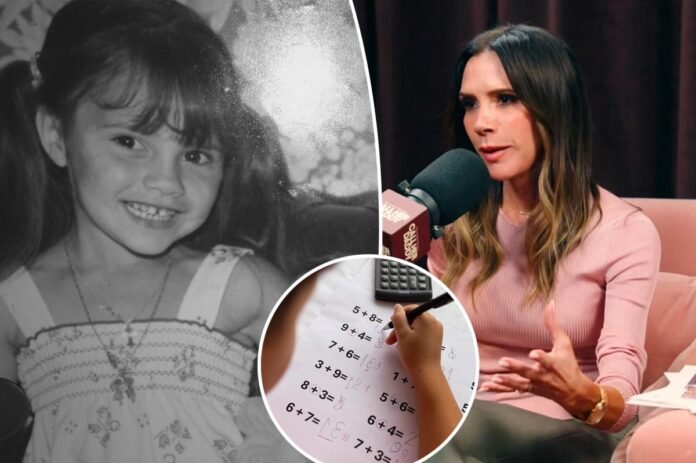What is Dyscalculia: Victoria Beckham opened up about a hidden struggle that many people with learning disorders keep to themselves. During a recent “Call Her Daddy” podcast interview, the former Spice Girl talked about how she was bullied at school and how she once found schoolwork almost impossible.
She said she believed herself to be dyslexic and dyscalculic – a learning disorder that makes math a real battle. When she was a child, classmates would call her “thick” and even throw cans at her on the playground. “My whole school life was miserable,” she told listeners.
What’s dyscalculia?
Dyscalculia is a real learning disorder that hinders understanding and working with numbers. Scientists think it may come from differences in parts of the brain that handle numbers, such as the parietal and frontal lobes. Though the exact cause isn’t known, research suggests that dyscalculia runs in families, pointing to a possible genetic link.
When people develop dyscalculia after brain injury or illness, it’s called acquired dyscalculia, not a learning disorder. That form can sometimes improve with the right treatment.
How common is it?
About 7 % of elementary‑school kids have dyscalculia, meaning a typical classroom can have one or two students who struggle with numbers. Many adults who didn’t realize they had dyscalculia are still dealing with its effects.
A strong overlap exists with dyslexia. Up to 40 % of children who struggle reading also face math challenges.
Signs that someone might have dyscalculia
Children and adults can show a range of clues. In school, students might:
– Miss numbers or view them as symbols instead of numbers
– Count slowly or need to use fingers for even small amounts
– Confuse numbers with words (e.g., “5” vs. “five”)
– Find patterns and sequences hard to follow
– Struggle with multiplication tables, fractions, and math functions
– Get lost on multi‑step word problems
At home, people may notice:
– Difficulty measuring ingredients or reading recipes
– Trouble handling money, tips, or estimating prices
– Forgetting phone numbers or ZIP codes
– Trouble judging distance, travel time, or directions
– Problems reading clocks or telling time
Because numbers feel so intimidating, many people with dyscalculia also experience anxiety or depression around math.
Can it be fixed?
There’s no cure for dyscalculia, but early help makes a big difference for kids. One‑to‑one programs with specialized teachers teach different ways to tackle math problems. Adults can’t cure dyscalculia itself, but they can learn coping strategies: using technology, calculators, or different methods to organise information. Acquired dyscalculia can sometimes improve, but the outcome depends on why it happened.
Victoria Beckham’s story reminds us that even very famous people can face hidden learning challenges. If you or someone you know feels uncomfortable with numbers, speaking to a teacher or learning‑disability specialist can open up practical ways to manage everyday math.
Source: New York Post
Stay informed on all the latest news, real-time breaking news updates, and follow all the important headlines in world News on Latest NewsX. Follow us on social media Facebook, Twitter(X), Gettr and subscribe our Youtube Channel.



